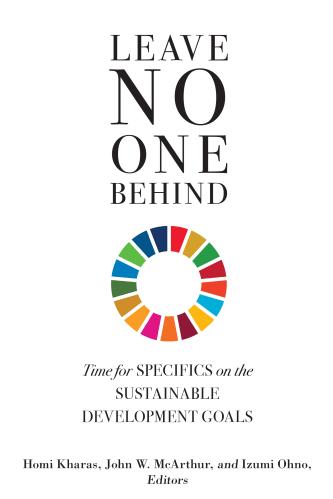Included in the Sustainable Development Goals (SDGs), established in 2015, is a pledge that “no one will be left behind.” It is an ambitious commitment that has grown in political resonance among U.N. agencies, national governments, intergovernmental organizations, and NGOs. But to drive meaningful results, the slogan will need to be met with action.
On October 18, the Global Economy and Development program at Brookings, together with the UN Foundation and the JICA Research Institute, co-hosted an event to highlight outcomes from the September SDG summit in New York and launch a newly edited book “Leave No One Behind: Time for Specifics on the Sustainable Development Goals.” The volume aims to translate that ambitious commitment into an action-oriented mindset, focused on supporting specific people in specific places who are facing specific problems.
John McArthur, senior fellow at Brookings and senior advisor at the UN Foundation, opened the event with the big question of what is at stake by illustrating how the SDG pledges come down to specific people’s lives:
Kathy Calvin, CEO of the UN Foundation, explained how the next 10 years will be defined as the decade of delivery for the SDGs:
Juan Ariel Jimenez, minister of economy, planning, and development for the Dominican Republic, shared a few examples of how the Dominican Republic is translating particular SDGs into specific policies:
Ibrahima Guimba-Saïdou, minister – special advisor to the President of Niger, shared how Niger is creating citizen-centric approaches around service delivery, particularly through the use of technology:
Izumi Ohno, director of the Japan International Cooperation Agency Research Institute, shared how global events, such as the Tokyo 2020 Olympics and the 2019 G-20 meeting in Osaka, are important benchmarks for Japan to share their own experiences and knowledge:
The Brookings Institution is committed to quality, independence, and impact.
We are supported by a diverse array of funders. In line with our values and policies, each Brookings publication represents the sole views of its author(s).








Commentary
People, places, and problems: Time for specifics on the Sustainable Development Goals
October 25, 2019